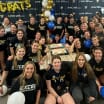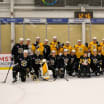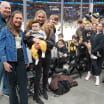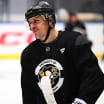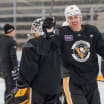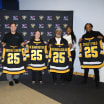Shannon Webster's Season-Ending Injury Led to Job with Penguins
The Penguins director of youth hockey realized her passion for working in the community during her playing days at Boston College
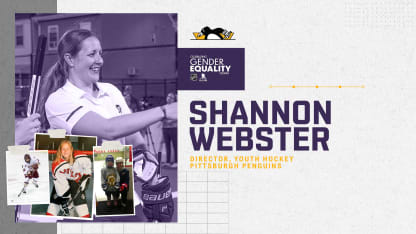
Webster, who played Division I hockey at Boston College, suffered a back injury at the end of her freshman season - which ultimately led to back surgery and redshirting her sophomore year. And now the defender, unable to play the sport that had always been her go-to, turned to a different aspect of being a college athlete to fill her time.
"During that redshirt season, I had a really hard time," Webster said. "Hockey was the thing I knew; it was my outlet. Now all of a sudden, I had all this time. So through the struggle of the injury and rehab, I really invested in trying to find a way to help my team despite not being able to be on the ice. Within that, I actually was able to connect with a local group in Newton. There was a guy there that worked with special athletes, and they had skates."
That guy was Mark Kelly, the Director of Special Needs for the city of Newton. With Kelly's help, Webster arranged for a handful of her teammates to volunteer weekly for those skates at The Fessenden School.
"They would sometimes come to our games to cheer us on, so I started putting together a group of our players to volunteer and go skate with them and teach them how," Webster recalled. "All we were doing was skating around the ice and listening to them tell their story of the day or whatever they did that week. It grew, so we ended up doing it that entire winter, and the more we went and volunteered our time, the more games they ended up coming to, and they were like our consistent fan base. So we developed relationships with a lot of the kids that were there and their families, and we continued to do that throughout my college career."
It was through this volunteer work that Webster realized her passion for working within her community.
Not only was she skating with the kids from The Fessenden School, but Webster also took time during her sophomore year to reach out to coaches of local girls teams and invite those teams to their games. Attending the women's hockey games was so fun for these young players, and it led to some autograph sessions and a chance for them to skate with the Eagles after their games.
"That kind of started the youth hockey aspect (of my career)," Webster said. "It was just a way to give back to the sport that obviously gave so much to myself, my teammates and my coaches throughout our lives and got us to where we were at the time, and really even where we are in life at this point."
After graduating in 2010 with two St. Ignatius Team Service Awards to her name, Webster - a USA Hockey Level 4 certified coach - spent several years coaching and developing youth hockey players across the Denver area, where she grew up.
Before coming to Pittsburgh in 2019, Webster also worked for the U.S. Olympic Committee and USA Hockey. At USA Hockey, much of what she did revolved around youth hockey initiatives and growing the game across the United States.
She was integral in creating awareness and participation in girls hockey, coordinating and consulting on nationwide youth hockey programs, including leading the logistical work for the National Try Hockey For Free Days which touched over 25,000 families annually in 600 locations.
Now in her current role with the Penguins, Webster uses some of her own experiences from her youth hockey days as one factor that drives her.
"I think you're constantly trying to make sure that the things that you noticed when you were a kid are fixed," Webster said. "For example, I had to get dressed in basically a janitor's closet when I was growing up playing on a boys hockey team, and there's no reason that girls today should need to have that experience. So you just try to right the wrongs that you have experienced and lived through, in a sense."
And since coming to Pittsburgh, Webster has overseen and directed countless events for local youth, including a Golden Ticket Skate with members of the Sidney Crosby's Little Penguins Learn to Play Program last February.
"It was awesome," she said. "I really just took five minutes to kind of absorb what was happening and the look on parents' faces and kids' faces when Sid jumped on the ice."
Another one of Webster's favorite events was when the U.S. and Canadian women's national teams came for a weeklong joint training camp in November 2019.
"I loved organizing the community initiatives that we did each day that week," said Webster. "We set up opportunities for local girls to interact with these athletes, these women that they see in the Olympic Games. To have them on the same sheet of ice was a lot of fun to facilitate on my end from a work standpoint, but also just to kind of absorb. I was fortunate to have some of those opportunities, and I remember the impact that it made on me. Ultimately, that was kind of what fueled my passion for the sport. I hope that one of those girls had that kind of an opportunity and utilized it and it made an impact on their lives."
As for what she and her team have planned for the future, Webster says they've got a couple things in the works - specifically with growing the game and providing more opportunities for girls to hop on the ice and feel comfortable and welcomed.
Webster also pointed to the Willie O'Ree Academy, a free initiative specifically designed to help develop experienced Black youth hockey players in the region by providing unique training and support opportunities, along with several Learn to Skate days that the Pens Foundation plans to host soon.
"Whoever might be walking down the street, we're trying to provide them an opportunity that anyone can fall into, where they can go pick up a stick and learn to stickhandle for a couple of minutes," Webster said. "Maybe it'll spark something in them, and that leads to them doing Learn to Play and Little Penguins and so on and so forth."
But above all, Webster wants to make sure that all the initiatives and programs the Penguins host are fun for participants, regardless of their hockey skill level and interest in competing seriously.
"It should be fun. I think that's the biggest motivator," Webster said of aspiring skaters. "That's kind of the biggest thing that sticks out to me, is make sure you're enjoying it and it'll all come together at that point. As long as you enjoy it and have fun, whatever's right and whatever is meant to be will happen within playing it."
For more information on the Penguins' Gender Equality Month initiatives, please visit this webpage.

